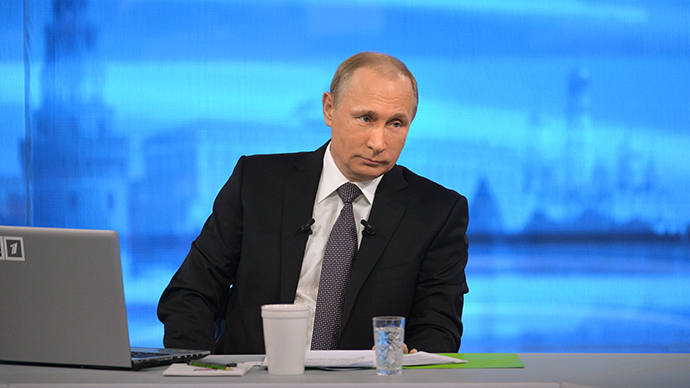'Worst is over' - Putin on Russian economy

Russia’s economy has managed to overcome the worst, as the national currency has become much stronger than most analysts expected, and all the key indicators are improving, President Vladimir Putin said.
“We’ve survived the peak of the problems. Russian banks and corporations have paid off their foreign currency debt,” Russian President Vladimir Putin said during his annual national Q & A session on Thursday.
The Russian economy will recover in about two years, he added. After only expanding 0.6 percent in 2014, GDP is expected to contract between 3.5 and 4 percent in 2015 and by 1 to 1.6 percent in 2016.
"I think that it may be faster. It will take about two years, I believe,"Putin stressed. Russian Finance Minister Anton Siluanov expects the economy to return to growth in 2016. Economy Minister Aleksey Ulyukayev expects an average 2.5 percent annual growth between 2016 and 2018.
READ MORE: Russia’s PM signs multibillion dollar anti-crisis plan
“I think we’ve taken the right measures,” Putin said, referring to the steps taken by the government and the Russian Central Bank to stabilize the economy in December to counter the huge currency devaluation, sanctions, and lower oil prices.
Russia rolled out a multibillion dollar anti-crisis plan in January, that included over 60 measures aimed at reversing Russia’s worsening economic situation, exacerbated by the ruble crisis.
“... steps provided by the plan are well thought out and reflect the state of our economy, and we have 2.3 trillion rubles earmarked for the implementation of this plan,” the Russian president said.
Putin pointed to the banking sector as a sure sign that Russia isn’t heading for financial failure.
"Russia's banking sector in 2014 has shown good dynamics. Loans in the real economy have increased. What is great is that in general, domestic bank assets increased to 77 trillion rubles, the first time it exceeded GDP. This is a very good indicator of the stability and reliability of the Russian banking system,” the President said.
The President also cited oil production as an example of economic strength. Oil production increased 1.1 percent to 525 million tons in 2014, a new post-Soviet record. The Russian Energy Ministry plans to meet or surpass it in the coming year.
Agriculture production was also made a government priority, with the Ministry of Agriculture predicting growth of 1.4 percent in 2015.In 2014 the index of agricultural production was 103.7 percent, which was 1.2 percent higher than the target, according to preliminary data from Russia’s statistical service Rosstat.
Ruble's recovery
After losing about 50 percent of its value in 2014, the Russian ruble has recovered about 30 percent of its value in the first 3 months of 2015. The ruble rally was spurred by the Central Bank lowering interest rates, which brought investors scared by the crisis back to the Russian market.
The President said the growing value of the ruble was not tied exclusively to rising oil prices.
“The ruble has strengthened so much, there must be other [then oil - Ed.] factors,” Putin said.
READ MORE: Ruble passes 50 against USD for 1st time since November
The massive devaluation made paying off foreign debts more expensive for companies, but also had some positives, like higher revenue from oil, which is sold in dollars.
The Central Bank spent more than $90 billion from the currency reserves defending the ruble in 2014, but has spent significantly less in 2015 since the ruble has stabilized.
“The Central Bank doesn’t control the exchange rate. Unemployment is still 5.8 percent, not as much as Europe where it;s 11 percent,” Putin said.












